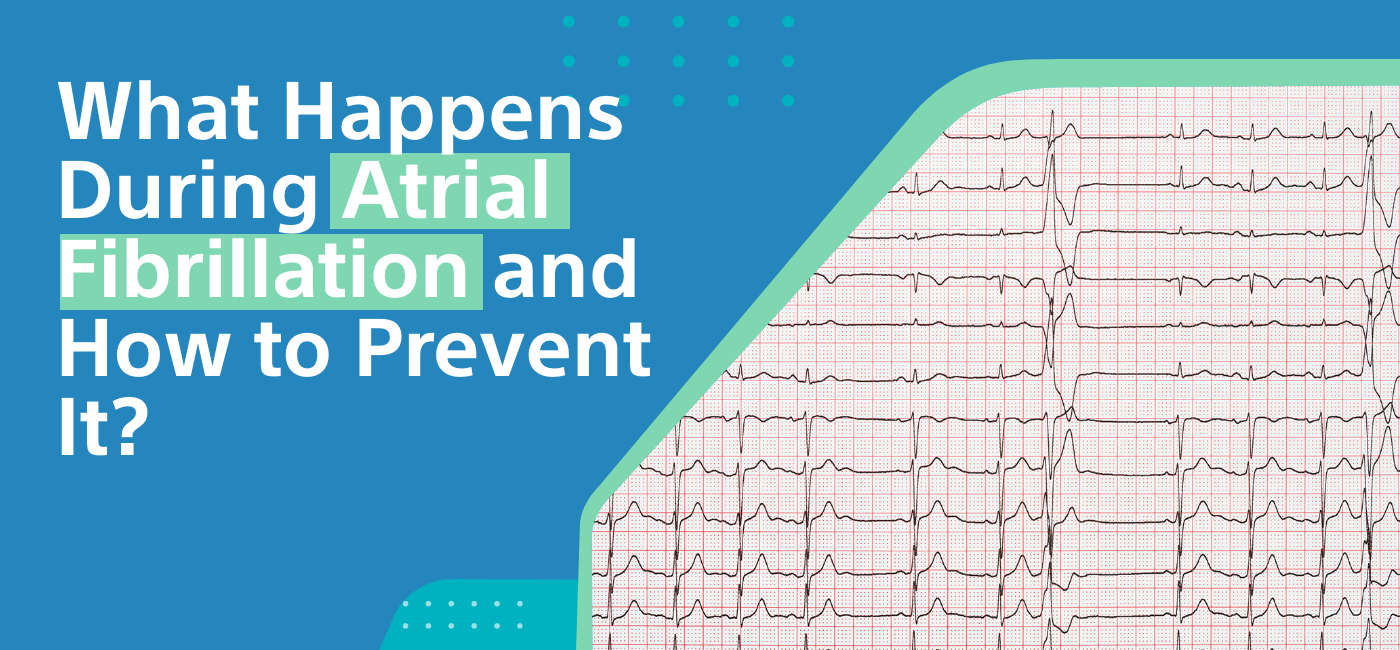What Happens During Atrial Fibrillation and How to Prevent?

Atrial fibrillation, or AFib, happens when the heart’s upper chambers (the atria) and lower chambers (the ventricles) lose their usual rhythm. Instead of beating in a steady, coordinated way, the atria quiver, and the ventricles may race or skip beats. This mixed-up timing slows blood flow and often leads to feeling unusually tired, lightheaded, or short of breath. At its root, AFib is all about scrambled electrical signals, so getting a handle on what makes those impulses go awry is essential for keeping your heart—and you—healthy.
Table of Contents
ToggleThe Mechanism of Atrial Fibrillation
How it actually works is pretty straightforward: the electrical messages that tell the atria to squeeze come in erratically instead of in a smooth sequence. Rather than a firm push, the atria wobble and fail to send the right volume of blood down into the ventricles. When this happens, the ventricles sometimes try to compensate by speeding up—but that only makes things feel more uncomfortable and less efficient.
During an atrial fibrillation episode, your heartbeat can jump around between about 100 and 175 beats per minute instead of staying in that comfy 60–100 range. You might notice your heart pounding hard, catching your breath more easily, or simply feeling wiped out. Those are all signs that the heart’s electrical wiring has gone off script—and why it’s so important to talk with a doctor if it keeps happening.
Although this structure and description have been given for pro-arrhythmia conditions, the same can also account for other heart conditions. Some people may also develop chest pain or dizziness. It is essential because the early signs of these diseases should prompt an individual to visit a doctor.
Identifying the Signs of Blockage in the Heart
Understanding when there is a possibility of the arteries that supply the heart being blocked is very important as it might lead to worse outcomes. Signs of a heart blockage might be chest pain, Shortness of breath, Nausea, Lightheadedness, and Sweating. These symptoms happen when the heart muscle cannot get enough oxygen-carrying blood through the arteries that are either congested or blocked. This means that awareness of these warning signs can cause appropriate treatment and cessation of a heart attack.
An individual with atrial fibrillation can experience worsening of the condition when they have a blockage in the heart. Restricted blood flow raises the strain when pumping blood and amplifies the possibility of AFib episodes in patients. Hence, awareness and intervention of blockage symptoms in the heart arteries are essential for patients with atrial fibrillation.
Causes and Risk Factors of Atrial Fibrillation
The causes of atrial fibrillation include hypertension, heart ailments, and past heart operations done on the alcoholic. Moreover, some lifestyle choices like heavy drinking, smoking, and obesity also predispose one to AFib. Other risk factors include increased risk of developing atrial fibrillation with Age.
Another factor that can influence the development of the disorder is genetics. A genetic predisposition also raises the risk as it was revealed that patients having relatives with AF are likely to experience the disorder. Thus, there is a need to be wary of the personal and family history of the disease to determine the potential for developing AFib.
Preventive Measures for Atrial Fibrillation
Measures that can be used to avoid new episodes of atrial fibrillation reduction entail controlling modifiable risk factors and practicing cardiology preventive measures. This wellness plan involves the understanding that regular moderate exercise, maintaining a healthy weight, and having a diet-rich in fruits, vegetables & whole grains contribute to potentially lowering the risks of AFib. Abstaining from alcohol, moderating the amount of alcohol consumed, and refraining from the use of tobacco are some more preventive measures that should be followed.
Medications and Treatments
There are drugs used for the management of atrial fibrillation in people who have been diagnosed with the condition. Antiplatelet medications, including warfarin or newer anticoagulants, lower the risk of stroke by retreating the blood to stop clotting. Therapies which are aimed at heart rate regulation, like beta-blockers or calcium channel blockers, can be prescribed by a doctor.
Occasionally, treatments might be required, particularly procedures undertaken with the patient’s consent, for severe or persistent cases of atrial fibrillation, cardioversion electrical, catheter ablation, and pacemaker implantation. They should consult a qualified healthcare provider for advice on the proper treatment.
Recognizing Signs of Blockage in Heart Arteries
The symptoms of blockage of arteries supplying the heart must be identified in patients with atrial fibrillation. Chest pain, squeezing, or pressure accompanied by pain that spreads to the shoulders, arms, or even the jaw should not be considered as usual. The shortness of breath that lasts and more so during exercises may also be a sign of blockage in the arteries supplying the heart. Not attending to these signs medically may lead to some dangers and affect the heart status.
Lifestyle Changes to Prevent Atrial Fibrillation
There are also ways to change one’s lifestyle slightly, which can decrease their chance of getting AF by a great deal. It also prevents or alleviates tendencies towards developing diseases that may affect the heart and the whole body. This may not necessarily be exhaustive exercises like running, but even simple activities like strolling, swimming, or cycling can go a long way.
However, perhaps one of the most important facets of health is a good diet, particularly one that is friendly to the heart. Eating foods with less cholesterol, saturated fats, and trans fats ensures the blood vessels are healthy and blockage-free. A recommended shift to a diet rich in fruits and vegetables, lean meats, and healthier fats such as those found in nuts, seeds, and fish is essential in providing the body with the necessary nutrients for the heart.
Monitoring and Managing Blood Pressure
Hypertension is one of the leading warning signs of atrial fibrillation and blockages of the heart’s arteries. Some people think that AFib cannot be prevented; however, it is preventable if one monitors one’s blood pressure frequently and ensures it is within the normal range. Restriction of salt intake, abstaining from alcohol or reducing its intake, the practice of relaxation measures, or counseling… are some of the ways that can ensure standard blood pressure rendering.
The Role of Regular Check-ups
The first and foremost thing a person should do is see a doctor for his or her routine check-up to identify Atrial Fibrillation and heart blockages at an early stage. It is better to get essential check-ups like blood tests, ECG, and stress tests to determine if there are any serious complications. They are the formal means to talk about symptoms, make necessary medication adjustments, and give or receive advice on preventing heart diseases.
Managing Stress and Mental Health
Stress and poor health cause the heart to beat irregularly and can lead to atrial fibrillation. Effective stress relievers include yoga, deep breathing exercises, and meditation because they help people avoid building up stress. Professional help from other practitioners like psychiatrists can also be very advisable when the need arises for one to lead a healthy life.
Understanding the Connection Between AFib and Heart Blockages
Thus, recognizing the correlation between AFib and blockages in the coronary arteries is significant for cohesively treating patients with cardiovascular diseases. There are also similarities in the symptoms, signs, and risk factors for developing both conditions, which include high blood pressure, obesity, and diabetes. Managing these factors contributes to the prevention of both and the subsequent formation of a healthier lifestyle.
Avoiding Triggers of Atrial Fibrillation
There may be a noted event that leads to atrial fibrillation. Caffeine and alcohol should not be taken because they have adverse effects on the rhythm of the heart, while stimulants should also be limited. Other factors that are very general but should be avoided to prevent AFib episodes include Avoid Botched Elective Procedures and Getting dehydrated, especially during hot weather or while engaging in any physical activity.
The Importance of Sleep
Sleep is essential for the overall well-being of the heart. Some factors that cause a person to have poor sleeping habits or sleep disorders, such as sleep apnea, can enhance the chances of getting AFib. Going to bed at the same time at night, avoiding caffeine and stimulants before bed, and using a practical sleep appliance were the recommendations made for improving sleep and overall cardiovascular health.
Recognizing Signs of Blockage in Heart Arteries Early
The manifestations of blockage in heart arteries leading to the heart being detected early can reduce complications like heart attack or stroke. Any person who clears the sudden ordinary tiredness, dizziness, or swelling of the legs should consult a doctor. These symptoms should be recognized as signals of heart problems that shouldn’t be ignored.
Recent Advances & Guideline Updates
In early 2025, both the American Heart Association and the European Society of Cardiology issued new joint guidelines emphasizing earlier use of non-vitamin K oral anticoagulants (NOACs) in low-risk AFib patients and recommending next-generation pulsed-field catheter ablation for select cases of paroxysmal AFib.
Wearable ECG monitors and smartphone-based photoplethysmography screening have also been validated in large trials, enabling earlier detection and outpatient management of asymptomatic episodes. These advancements reinforce a shift toward personalized, technology-assisted care—combining lifestyle interventions with precision-guided therapies—to improve long-term rhythm control and reduce stroke risk.
Conclusion
Atrial fibrillation is a condition that increases wealth in the heart and makes pumping less efficient. Thus, people need to know what occurs during the AF and what indicates blockage in the arteries that feed the heart to ensure their heart is healthy. Therefore, the prevention measures of AFib, coupled with the well-being of heart health by making lifestyle changes, appropriate risk control, and timely checkups, can be beneficial.
Moreover, the following measures as part of lifestyle can help avoid atrial fibrillation and other related complications: moderate exercise, proper diet, and reduced stress. The signs of blockage in heart arteries should be detected and treated as early as possible to improve the quality of life. The nature of the ongoing and steady communication with healthcare providers and patience in observed treatments bear fruit in proper atrial fibrillation treatment and improvement of patient’s quality of life.
Published by celina maghrebi
Platinum For Heart is your comprehensive source for all things related to heart health. We offer a wealth of knowledge on common heart attack signs and symptoms, along with essential precautions to prevent heart attacks. View more posts
Recent Post
How to Make a USB Mic Sound Better?







